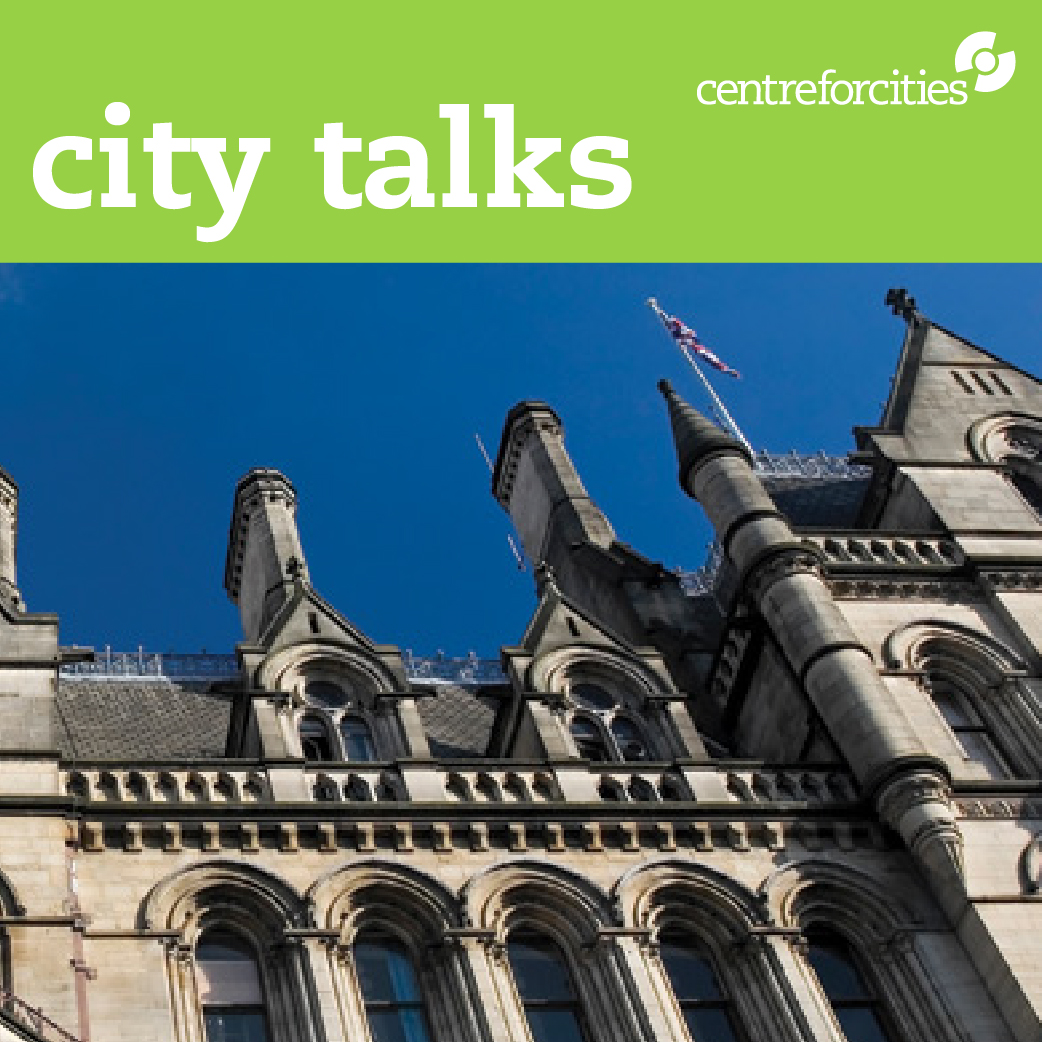
213.4K
Downloads
263
Episodes
Centre for Cities is the leading think tank dedicated to improving the economies of the UK’s largest cities and towns. In these podcasts, Chief Executive Andrew Carter interviews leading thinkers in the urban policy field, as well as experts from Centre for Cities about their research and ideas on improving the economies of cities and large towns.
Episodes

Friday Dec 15, 2017
City Horizons with Professor Ron Martin: Survival of the Cities?
Friday Dec 15, 2017
Friday Dec 15, 2017
In this City Horizons lecture, Professor Ron Martin, Professor of Economic Geography at Cambridge University and principal investigator in major ESRC funded project, City Evolutions, explored the resilience of British cities to major economic shocks.
With Brexit looming, and the prospect of future disruptive technological change, the economic future of British cities is unpredictable at best. Using half a century of detailed economic data for 85 cities across the country, Professor Martin will discuss the relevance of the notion of ‘resilience’ both in understanding how cities react to and recover from economic shocks. Looking at evidence from the three most recent recessions of the 80s, 90s and the crash of 2008, he will explore potential policy options that might help improve the robustness of cities to future turbulence.

Wednesday Nov 29, 2017
City Talks: If we build it, will they come?
Wednesday Nov 29, 2017
Wednesday Nov 29, 2017
In this month’s episode, our chief executive Andrew Carter talks with Bridget Rosewell, Commissioner of the National Infrastructure Commisssion, and Henry Overman, Professor of Economic Geography at LSE, about the role of infrastructure in supporting economic growth and jobs across the country.
Andrew and his guests consider the merits of big infrastructure projects such as Crossrail 2 and the Northern Powerhouse Rail. These decisions are notoriously tricky both in terms of weighing up costs to potential benefits if the project gets the go-ahead, as well as the possible consequences of doing nothing. If the objective is to increase people's access to the labour market, our panellists argue that improving transport infrastructure alone may not be enough. For instance, the London Borough of Barking and Dagenham has fantastic transport connections to the biggest agglomeration of jobs in the UK, but life outcomes for residents are poor. They examine all the obstacles that prevent people accessing jobs such as skills and health outcomes, and debate options to improve their prospects.

Thursday Oct 26, 2017
City Talks: Growing Urban Inequality with Professor Michael Storper
Thursday Oct 26, 2017
Thursday Oct 26, 2017
In this month's episode, our chief executive Andrew talks with Professor Michael Storper (UCLA, Sciences PO and the LSE) about the widening gap between successful cities and struggling places, and how this is contributing to the political tensions which helped drive the vote for Brexit and the election of Donald Trump.
With migration between cities in decline and the diffusion of jobs lessening over time, they discuss why it's become much harder for people who grow up in lower income areas to move into and thrive in economically vibrant cities like London, and the limited role that housing policy can play in addressing these problems.
Prof Storper also talks about his fascinating research comparing the paths of San Francisco and Los Angeles from the 1970s to the present day. He gives a nod to our report A Century of Cities to illustrate the success of cities who reinvent themselves and so prosper in the future. Finally, Andrew and Prof Storper turn to how policy can help middle-income cities grow, and how regional cities in developed countries have been affected by the loss of jobs to countries such as India and China.

Thursday Sep 28, 2017
City Talks: Challenging the myths about migration
Thursday Sep 28, 2017
Thursday Sep 28, 2017
In this month’s episode, Andrew explores the economic impact of migration on UK cities with Dr Nicola Headlam Urban Transformations & Foresight Future of Cities Knowledge Exchange Research Fellow at the University of Oxford and Dr Max Nathan, Senior Birmingham Fellow (Regional Economic Development) at Birmingham Business School and Deputy Director at the What Works Centre for Local Economic Growth.
With the recent revelation from the Office of National Statistics that only 4,600 international students overstayed their visas last year, overturning previous suggestions that the number was closer to 100,000, Andrew and his guests discuss how and why the debate on migration in the UK has become 'evidence free'.
From the benefits of cognitive diversity in the workforce to the success of the entrepreneur program, our guests offer insights from their own research on the less publicised impacts migrants have on the economy. They go on to discuss the big question; does net migration have an overall positive or negative effect on the UK economy? Finally they consider how Brexit might affect migration patterns and examine what benefits the diasporic community can have on facilitating trade links with new markets.

Wednesday Sep 13, 2017
City Horizons: Professor Michael Storper
Wednesday Sep 13, 2017
Wednesday Sep 13, 2017
Centre for Cities was delighted to welcome Professor Michael Storper named by Thomson Reuters as one of the “World’s Most Influential Scientific Minds”, author of The Rise and Fall of Urban Economies and teacher at UCLA, Sciences PO and the LSE.
In an environment where the highly urbanised UK economy is experiencing deeper economic divides between not only its most and least successful cities, but between prosperous cities and its other regions, Professor Storper explored emergent trends in international urbanisation and how similar inequalities are played out on the global stage.
The lecture also explored what these divides mean both for economic policy and for current thinking around inclusive growth and spreading wealth to less prosperous places.
Sign up to the Centre for Cities mailing list to recieve updates on future City Horizons events.

Friday Jul 21, 2017
City Horizons: Professor Diane Coyle
Friday Jul 21, 2017
Friday Jul 21, 2017
Professor Diane Coyle is a Professor of Economics at the University of Manchester and author of several books including Sex Drugs and Economics, The Economics of Enough and GDP: A Brief but Affectionate History. At our City Horizons event held at the Shard on 20th July 2017, Professor Diane Coyle spoke about the role of cities as part of a modern industrial strategy, what that means for the UK’s global standing and its impact on nationwide economic growth.

Thursday Jul 20, 2017
City Talks: Resolving the Air Pollution Crisis in our Cities
Thursday Jul 20, 2017
Thursday Jul 20, 2017
In this month's episode, Andrew explores the topic of air pollution with Caroline Russell, Green Party member of the London Assembly, and Andrea Lee from Client Earth, a group of activist environmental lawyers which is currently challenging the Government's air quality plans in court.
With fatal levels of air pollution responsible for an estimated 40,000 deaths a year in the UK each year, Andrew and his guests consider how our air became so toxic. They examine the effect of tax breaks for diesel vehicles, motor companies cheating emissions tests and the impact of tech giants such as Amazon and Uber on our roads. They also discuss what cities can do to address air pollution, including London’s plan for an Ultra Low Emission Zone to be introduced in 2019. Finally, our guests talk about the role that the new metro mayors can play in raising awareness of air quality and fighting for clean air in their cities.
Before that, Andrew catches up with Centre for Cities' Naomi Clayton and Brian Semple to discuss the latest policy developments, including the Taylor Review's implications for different cities, the future of business rates devolution and what we learnt from Greg Clark's recent speech on industrial strategy.
If you enjoy this episode of City Talks, please take a moment to rate and review us!

Thursday Jun 15, 2017
City Talks: post-election special with Tony Travers
Thursday Jun 15, 2017
Thursday Jun 15, 2017
In this month's post-election special, Andrew reflects on the surprising results with Tony Travers, Director at LSE, considering the changing loyalties of the electorate, what a hung parliament will mean for the new mayors and whether we will start to see a cross-party approach to Brexit.
They also discuss how the electorate has strayed from traditional party loyalties, voting instead to rage against the machine, or as a tool to deliver a message on Brexit or austerity.
The outcome of the General Election leaves Westminster considerably weaker than before. With the DUP set to seal a deal with the government and the Scottish Conservatives winning 13 seats, Northern Ireland and Scotland are in a strong position to make demands, likely to be at the expense of massive progress made in cities over the last two parliaments. But they discuss how the new mayors are in a unique position to drive the country forward and negotiate for their respective cities.
Finally, with austerity now in its eighth year with no sign of an end, they ask whether funding and financing could be handed down to a city level giving councils the freedom to set taxes locally.

Wednesday Jun 14, 2017
Roundtable with Carl Weisbrod, Chairman of the New York City Planning Commission
Wednesday Jun 14, 2017
Wednesday Jun 14, 2017
In the week of his talk at the London Real Estate Conference, Centre for Cities was delighted to host an intimate roundtable with Chairman of the New York City Planning Commission, Carl Weisbrod.
Listen to Weisbrod talk about his work with Mayors De Blasio, Bloomberg and Dinkins as well as his time working in private sector development. His successes include transforming Times Square in to the commercial hub we see today, as well as regenerating Hudson Park and leading the post-9/11 recovery. He has also had a frontline role in addressing the problems caused by New York City’s unaffordable housing market.
See all future Centre for City events on our website: http://www.centreforcities.org/

Thursday May 11, 2017
City Talks: Mike Emmerich on Britian's Cities, Britain's Future
Thursday May 11, 2017
Thursday May 11, 2017
In this month's podcast, Andrew chats to Mike Emmerich author of 'Britain's Cities, Britain's Future' ex-Treasury civil servant and founding Director of Metro Dynamics.
In the book, Emmerich looks back at the 200-year history of British cities - once the engines of the industrial revolution and an example to other nations - to help better understand how urban Britain of the present, and future, can prosper in a globalised, post-Brexit climate.
Andrew and Mike discuss, the way cities like Manchester's cottonopolis grew and developed, and the formation of their public sectors and institutions. They consider how cultures of entrepreneurship, or an ideology of individualism throughout recent history, could have had an impact on the way British cities have both grown and suffered decline. Finally, they discuss the opportunities and challenges for those cities that have just elected metro mayors.
Before speaking with Mike, Andrew first catches up with Centre for Cities colleagues Paul Swinney and Simon Jeffrey to discuss last week's surprising metro mayor election results and how these powerful new city leaders are likely to take their mandates forward.
